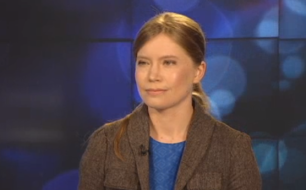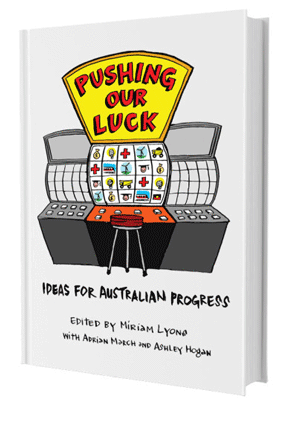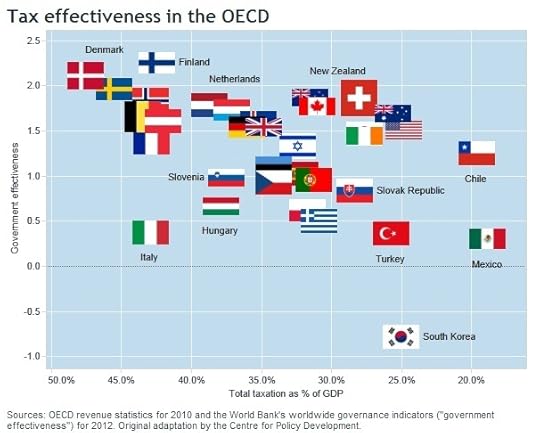Centre for Policy Development's Blog, page 58
December 31, 2013
ABC Local Radio | 20 December 2013

Electricity prices have been on the rise for all consumers.
The blame is often placed on solar users but a large increase in costs is due to air conditioner use. Laura Eadie, CPD’s sustainable economy research director recently released Getting the facts right on Solar a report that looks at what is really driving higher electricity networks costs. Laura spoke to Stan Thomson broadcast on 891 ABC Adelaide about her findings.
“…adding a single air conditioner adds about $2400 of investment need to the electricity networks and once that investment is made that is recovered from all consumers.”
Getting the facts right on Solar shows that adding rooftop solar to the network reduces bills faced by other households due to air-conditioning.
Listen to Stan and Laura:
http://cpd.org.au/wp-content/uploads/2014/01/Adelaide-radio-solar-Laura-Eadie.mp3

December 18, 2013
ABC The Drum | 18 December 2013

Miriam Lyons on the panel for The Drum.
Holden package, NDIS changes and the Racial Discrimination Act.
Steve Cannane host of The Drum on ABC News 24 was joined by panellists Paul Sheehan of The Sydney Morning Herald, Newscorp’s Jessica Irvine and CPD’s executive director Miriam Lyons. As the final Wednesday episode for the year the panel discuss the $100 million package announced by Tony Abbott and the Industry Minister to offset job losses due to Holden ending car manufacturing in Australia, cuts to the National Disability Insurance Scheme and possible changes to the Racial Discrimination Act.
“On this episode of the Drum, Labor slams Tony Abbott’s manufacturing fund as “woefully inadequate”, the new Freedom Commissioner pushes for a repeal of a key section of the Racial Discrimination Act and Eddie Obeid faces the prospect of handing back millions of dollars worth of ill-gotten gains.”
Watch the episode at The Drum

CPD welcomes its new CEO!
The Centre for Policy Development is delighted to introduce Travers McLeod.
 He joins CPD from the Oxford Martin School, an interdisciplinary community of scholars at the University of Oxford, where he worked on Now for the Long Term, the report of the Oxford Martin Commission for Future Generations.It’s hard to imagine a better prelude to life at the Centre for Policy Development than Travers’ experience in helping the Commissioners to make the case for overcoming short-termism to break the gridlock on global challenges and build a more prosperous, equitable and sustainable future.
He joins CPD from the Oxford Martin School, an interdisciplinary community of scholars at the University of Oxford, where he worked on Now for the Long Term, the report of the Oxford Martin Commission for Future Generations.It’s hard to imagine a better prelude to life at the Centre for Policy Development than Travers’ experience in helping the Commissioners to make the case for overcoming short-termism to break the gridlock on global challenges and build a more prosperous, equitable and sustainable future.
Travers grew up in Exmouth and Perth in Western Australia and is now based in Melbourne. For much of the past six years he has lived in the United Kingdom.He completed a DPhil and MPhil in International Relations at Balliol College, Oxford, where he studied as a Rhodes Scholar, and was a Lecturer in Politics and International Relations at Merton College, also at the University of Oxford.
Before leaving for the UK he worked as a lawyer in Australia, and was an associate to Justice Michael Kirby in the High Court.Travers joins CPD with a strong international network and publishing record. Now for the Long Term, which Travers played a key role in delivering, has received endorsements from around the world and been downloaded nearly 600,000 times since its launch. The Oxford Martin Commission for Future Generations included a number of eminent leaders and was chaired by Pascal Lamy, former Director-General of the World Trade Organisation. Oxford University Press will publish Travers’ doctoral thesis on the function of law in United States counterinsurgency next year.
Having returned to Australia, Travers is excited about the prospect of contributing to public policy debates at home. “My work in Oxford has allowed me to investigate long-term global trends and policy challenges likely to dominate this century, and the ways in which institutions (be they in government, business or the non-profit sector) can capitalise on future opportunities and minimise the downside risks”, Travers said. “The chance to lead CPD is an exciting opportunity to apply these insights at home. I have big shoes to fill, but look forward to growing an organisation driven to producing positive and impactful ideas to steer Australia and the region in a more inclusive and resilient direction over the long term.”
Travers will take over from CPD’s Founder and current Executive Director, Miriam Lyons. Miriam has built the organisation into one of Australia’s leading independent progressive think tanks, with a hard-earned reputation for injecting constructive ideas into Australian policy debates. Miriam will remain connected with CPD as a Fellow. “After just one week working alongside Travers as he takes over the leadership of CPD, I’ve been so impressed by his intelligence, his dedication to evidence-based policy and his commitment to building the broadest possible constituency for ideas that could make Australia a fairer and more sustainable place to live. I can’t wait to see what he and the rest of the CPD team achieve together over the coming years.”

Short-term thinking cannot address Australia’s long-term dilemmas – help Travers’ team look further ahead!

December 11, 2013
Getting the facts right on Solar | OCCASIONAL PAPER
What is really driving higher electricity network costs…
… and how can they be fairly shared between consumers?
This report, prepared for CPD by the Australian PV Institute (APVI), is the first to examine the interaction of new technologies with network tariffs, rather than wholesale electricity prices.
Key findings include:
Rooftop solar has been reducing higher network costs driven by air-conditioning.
The current direction of electricity reform unintentionally increases cost impacts of air-conditioning for households, while limiting solar’s ability to offset it.
Time-of-use pricing could make the so called ‘death spiral’ for networks worse by reducing their revenue, or increasing household bills.
A network tariff based on customers annual peak demand is a better solution than the ‘blunt instrument’ of higher fixed charges or disconnection fees.
Households installing air conditioning increase everyone else’s bills, while rooftop solar saves for all
Adding rooftop solar to the network reduces bills faced by other households due to air-conditioning. The Centre for Policy Development, along with with the APVA (Australian PV Institute), quantify the real impacts of rooftop solar on other households’ bills. This shows there are more equitable and effective ways to share network costs – rather than the blunt instrument of charging solar consumers extra levies.
The issue of network costs is highly topical, especially in light of the price ‘hikes’ to be confirmed in Queensland next week. As consumer demand for electricity peaks for the year thanks to air conditioning, what better time to consider policy solutions to protect responsible use of resources – including household budgets?
Download CPD OP35 – Getting the facts right on solar
Download APVI Impacts of technologies & tariffs
Short-term thinking can’t address Australia’s long-term dilemmas – Help us look further ahead!

December 9, 2013
Get a copy of new CPD book Pushing our luck anytime!

Order Pushing our luck: ideas for Australian progress – you can get an e-book to download instantly, any time!
Hard copy (paperback) books, ePub and MOBI e-books are now available online
Buy a copy of Pushing our luck for yourself or a deserving friend, because:
 it gives important thinkers space to imagine better ways to do things, based on real evidence, for a fairer and more sustainable Australia
it gives important thinkers space to imagine better ways to do things, based on real evidence, for a fairer and more sustainable Australiait goes beyond sound bites and slogans to look at the real issues that will shape Australia’s future
your purchase will help CPD to keep on making good ideas matter.
it’s a great read
To order a copy now, please visit the ‘CPD shop’ here
What a great gift idea for the ‘ideas person’ in your life!

Get a copy of new CPD book Pushing our luck for Christmas!
 Pushing our luck: ideas for Australian progress
Pushing our luck: ideas for Australian progressGet your hands on the hard stuff – what a great seasonal gift idea for the ideas person in your life!
hard copy books, ePub and MOBI e-books are now available online
Buy a copy of Pushing our luck: ideas for Australian progress for yourself or a deserving friend, because:
it gives important thinkers space to imagine better ways to do things, based on real evidence, for a fairer and more sustainable Australia
it goes beyond sound bites and slogans to look at the real issues that will shape Australia’s future
your purchase will help CPD to keep on making good ideas matter.
it’s a great read

To order a copy now, please visit the ‘CPD shop’ here

December 5, 2013
ABC News, Business Review Weekly, APN Group, & Dredging Today | November 2013
Enough Port Capacity Until 2017 (Australia)
Research director Laura Eadie is author of recently released CPD report Too many ports in a storm, which questions government plans to expand and create new coal ports when there is enough capacity until at least 2017.
“In a comprehensive overview of Queensland’s approach to port development, the report shows that perverse incentives, inadequate information and confused governance led to surplus capacity.”
Queensland ports only working at 65% capacity
Laura’s research indicates that Australian ports are running 20% below the industry average capacity of 85%. A predicted reduction in demand from China could mean planned ports and mines are not viable.
Queensland coal ports: shortfall or surplus?
In response to the report the Queensland Resources Council say “more port capacity is needed to avoid bottlenecks” despite the fact that BHP Billiton has withdrawn from development of Abbot point suggesting enough port capacity until 2024.
What the mixed signals about mining’s future really say
The Queensland Resources Council believes there will be growth in coal demand between 3-5% per annum in the foreseeable future. Does this justify new ports and expansion? If current port capacity will be sufficient until at least 2017, more likely 2020 according to CPD’s research, the pre-emptive decision to build ports could hurt Australia’s competitive future.
Dredging Today – ‘New Report: Enough Port Capacity Until 2017 (Australia)’
Gladstone Observer - ’Report: Queensland ports only working at 65% capacity’
ABC News – ‘Report claims Queensland ports not needed’ | ‘BHP Billiton axes Abbot Point rail plan’
Business Review Weekly – ’Queensland coal ports: shortfall or surplus?’
Sunshine Coast Daily – ‘What the mixed signals about mining’s future really say’
Change can happen faster than you think – help us seize the moment and point to the alternatives. Add your voice to ours!

The Age | 2 December 2013
Despite claims by the government that there is a surplus of public servants, recent report Bang for our bucks by CPD research director Christopher Stone shows that Australia’s public service is among the worlds most efficient. Ranking the 5th lowest OECD country for taxes, Australia has one of the most effective governments.
In The Age Paddy Gourley discusses the government’s plans to reduce the public sector and how the government needs better management of staff levels in an article at The Age.
“The Abbott government’s plan to save billions of dollars by ”freezing” recruitment to the Australian Public Service has collapsed under the weight of the dim-witted way in which it appears it was formulated.”

[image error]
Read Paddy Gourley’s article at TheAge.com.au
 Help us counter evidence-free attempts to downsize and privatise our public services –
become a CPD Ideas Sustainer!
Help us counter evidence-free attempts to downsize and privatise our public services –
become a CPD Ideas Sustainer!

December 1, 2013
The Brisbane Times | 27 November 2013

Coal ports under-used thanks to oversupply
The release of CPD’s recent report ‘Too many ports in a storm’ has raised debate over the future of coal and construction of new coal ports. In The Brisbane Times Cameron Atfield discusses the report by sustainable economy research director Laura Eadie. With ports currently operating at 65% capacity (20% below industry average) a further surplus of ports will be a competitive disadvantage and run the risk of abandoned facilities.
“Ports delivering record coal haul”
A joint statement by Ministers Tim Nicholls and Scott Emerson suggests that the state government is unconcerned at the results of CPD’s research. They claim that coal export growth is strong and are hopeful that this will continue.
If coal’s in trouble, why build more coal ports?
In an opinion piece for The Conversation Laura Eadie explained why coal growth is in trouble, with China planning to cap thermal coal use, seaborne trade growth predicted at 1%, and previous high prices out of the question. Why build more coal ports when the future is in doubt and our current ports are so far below industry averages?
“Encouraging private investment by dredging before port investments are confirmed risks environmental damage for what may turn out to be no good reason. If more development leads to stranded assets, job cuts and budget shortfalls will be a problem for the government not just the private sector.”
Cameron Atfield’s article at The Brisbane Times
Media release by Tim Nicholls and Scott Emerson
Laura’s article at The Conversation

November 26, 2013
Sunshine Coast Daily | 26 November 2013
 Economist: Keep NSW marine parks for at least 15 years
Economist: Keep NSW marine parks for at least 15 yearsCoastal coverage for CPD’s Marine protection dividend paper
According to the newsdesk covering over ten local papers on the NSW and Queensland coasts, CPD fellow Caroline Hoisington wrote that marine parks in NSW have not been in place long enough to determine environmental benefits.
A FORMER World Bank economist has called on the Federal Government to keep marine parks on the New South Wales’ coast for at least 15 years before abandoning the protected areas.
… Ms Hoisington wrote that the parks off the NSW coast were, in ecological terms, “still in their infancy”, also arguing they were already paying dividends to local communities through tourism.
The paper argues the Solitary Island and Jervis Bay marine parks brought a 20% increase to local business turnover and $2.4 million into the local regions, respectively.
Read the Sunshine Coast Daily article online
Read CPD OP34 Marine Protection Dividend paper
Change can happen faster than you think – help us seize the moment and point to the alternatives. Add your voice to ours!

Centre for Policy Development's Blog
- Centre for Policy Development's profile
- 1 follower



